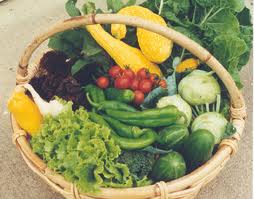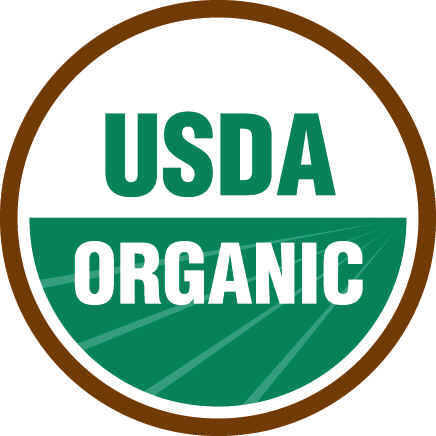Important Information About Organic Food
What does “Organic Food” even mean, anyway?
To call a food organic simply means that it’s been produced using environmentally sound methods – methods that emphasize the use of renewable resources, soil conversation, and water conservation to keep a high quality growing environment.
Organic foods are produced without pesticides & chemical fertilizers. They don’t have genetically modified organisms, are not processed with irradiation, industrial solvents, or with chemical food additives.
For meats and dairy, organic implies that the livestock has been raised in a healthy, humane environment, with fresh air and outdoor access, no antibiotics, or growth hormones. The livestock is fed organically grown feed.
To see the USDA’s exact definition & regulations, you can check out the National Agricultural Library and the USDA’s National Organic Program.
Organic Food Labels
There are four levels of organic labeling.
- 100% Organic: This means that the food can only contain organic ingredients. That means no hormones, genetic engineering, antibiotics, radiation, or synthetic pesticides or fertilizers.
- Organic: This means that the food contains 95% organic ingredients. In order to be labeled “organic”, the remaining 5% of ingredients can’t be found in an organic form.
- Made With Organic Ingredients: This means the food has at least 70% organic ingredients. Three of these ingredients must be listed on the package.
- Foods with less than 70% organic ingredients can only have “organic” in their lists of ingredients.
Natural Foods vs. Organic Foods
Where organic food has legal definitions & standards for what it actually is created with, the word “natural” in food labeling does not. In general, it’s supposed to imply that the food is minimally processed and does not contain any manufactured ingredients. However, there are no official standards for “natural food”. The FAO (Food & Agricultural Organization) does not recognize the term “natural”. The FDA and USDA both do not have any rules for “natural” labeling. In fact, the FDA has discouraged the food industry from using the term.
In a perfect world, food manufacturers would not call their food or ingredients “natural” if they weren’t – but as there is no legal meaning to “natural”, it means manufacturers have almost free reign to call their foods “natural” even if they are not.
There is even an act, The Food, Drug, & Cosmetic Act that prohibits labeling food that is false or misleading, however, it doesn’t give any specifics.
Ultimately, it is up to you, the consumer, to be responsible with your food purchase choices.
5 Reasons To Choose Organic Foods
1. Organic Farming is less toxic for the environment.
Industrial farming uses synthetic pesticides, which can drift downstream and cause serious damage to non-farming communities. These farming methods can damage the soil and make it harder to grow healthy crops for future generations. Organic farming limits these toxic chemicals in our environment.

When foods are grown with pesticides & chemicals, where do you think those chemicals end up? Pesticides can do decrease fertility, increase your risk of cancer, and do damage to your nervous system. Organic foods generally have higher levels of vitamins, minerals, and antioxidants than their conventional counterparts.
3. Organic Food Tastes Great!
The truth is, organic food simply tastes better. It makes sense that the food that is grown in a real growing environment would be more flavorful.
4. Helps Local & Family Farmers
While organic farming has grown from nothing to a $51 billion dollar industry in the span of around 20 years, only .7% of the total worlds farmland is organically farmed. There are over 13,000 certified organic producers in the United States. The more demand for organic food, the bigger the industry will get. And as the industry grows, more farms will use organic farming methods to satisfy the demand. So it’s a win-win! You eat organic foods, and more organic foods get farmed.
5. Organic Food Meets Strict USDA Standards
The USDA has created standards for organic foods and organic farming designed to protect you when purchasing organic foods. Organic foods are safe, good for you, and highly regulated to make sure that you continue to be safe in choosing organic foods.
Top 3 Organic Food Myths
There’s a lot of misinformation out there about organic food – here are the top 3 myths that we’ve found and information dispelling them.
1. Organic Food is the same as Natural Food
Organic food actually has legal definitions and regulations as to what you can call organic, and what you cannot. Natural food does not – so natural food is NOT the same organic food.

While organic food in general is 10-40% more expensive than it’s “conventional” counterparts, we believe that the benefits of eating organically far outweigh the costs. You are what you eat – the more organically grown food you put in your body, and the less toxic chemicals you put in your body, the better.
3. Organic Food Has No Taste
This is simply untrue. Although taste is ultimately subjective, we believe that organic snack food tastes phenomenal, organic fruits and vegetables are much better tasting than their conventional versions, and organic meats simply cannot be beat by conventional ones.
10 Organic Foods To Buy
We sell a large amount of high quality organic foods here on True Foods Market. Just search “Organic” in our search bar to see what we have to offer!
Here’s a sample of some of the organic foods that we sell:
Peanut Butter: http://truefoodsmarket.com/peanutbutter-creamy-unsalted-org-16-ozs.html
Baby Food: http://truefoodsmarket.com/baby-sweet-peas-organic-3-x-4-ozs.html
http://truefoodsmarket.com/cabana-banana-organic-3-x-4-ozs.html
http://truefoodsmarket.com/country-apples-organic-3-x-4-ozs.html
Rice: http://truefoodsmarket.com/long-grain-brown-rice-organic-2-lbs.html
http://truefoodsmarket.com/lundberg-basmati-white-rice-organic-2-lbs.html
Oats: http://truefoodsmarket.com/steel-cut-oats-whole-grain-organic-35-ozs-35-ozs.html
http://truefoodsmarket.com/certified-gluten-free-rolled-oats-44-ozs.html
Pasta: http://truefoodsmarket.com/angel-hair-semolina-pasta-org-12-ozs-12-ozs.html
http://truefoodsmarket.com/brown-rice-penne-pasta-organic-12-ozs.html
http://truefoodsmarket.com/spaghetti-whole-wheat-organic-2-5-lbs.html
http://truefoodsmarket.com/penne-pasta-ww-organic-2-5-lbs.html
Quinoa: http://truefoodsmarket.com/quinoa-organic-33-oz-33-oz.html
Coffee: http://truefoodsmarket.com/maya-chocolate-herbal-coffee-organi-11-ozs.html
http://truefoodsmarket.com/maya-chai-herbal-coffee-organic-11-ozs.html
http://truefoodsmarket.com/maya-caffe-herbal-coffee-organic-11-ozs.html
Marinara Sauce: http://truefoodsmarket.com/pasta-sauce-marinara-organic-25-ozs.html
Condiments
Yellow Mustard: http://truefoodsmarket.com/yellow-mustard-organic-16-ozs.html
Dijon Mustard: http://truefoodsmarket.com/dijon-mustard-organic-8-ozs.html
Tomato Ketchup: http://truefoodsmarket.com/tomato-ketchup-organic-24-ozs.html
Salsa: http://truefoodsmarket.com/salsa-mild-16-ozs.html
Seasonings
Chili Powder: http://truefoodsmarket.com/chili-powder-mild-organic-4-ozs.html
Cayenne Pepper: http://truefoodsmarket.com/cayenne-ground-organic-4-ozs.html
Cilantro: http://truefoodsmarket.com/cilantro-cut-sifted-organic-4-ozs.html
Cinnamon: http://truefoodsmarket.com/cinnamon-ground-organic-4-ozs.html
Coriander Seed: http://truefoodsmarket.com/coriander-seed-ground-organic-4-ozs.html
Cumin Seed: http://truefoodsmarket.com/cumin-seed-ground-organic-4-ozs.html
Curry Powder: http://truefoodsmarket.com/curry-powder-organic-4-ozs.html
Garlic Granules: http://truefoodsmarket.com/garlic-granules-organic-4-ozs.html
Garlic Powder: http://truefoodsmarket.com/garlic-powder-organic-4-ozs.html
If you enjoy Organic Food then you’ve come to the right place at True Foods Market. Happy shopping!




















































